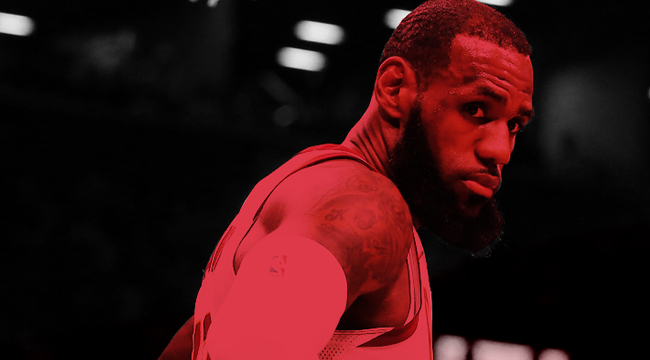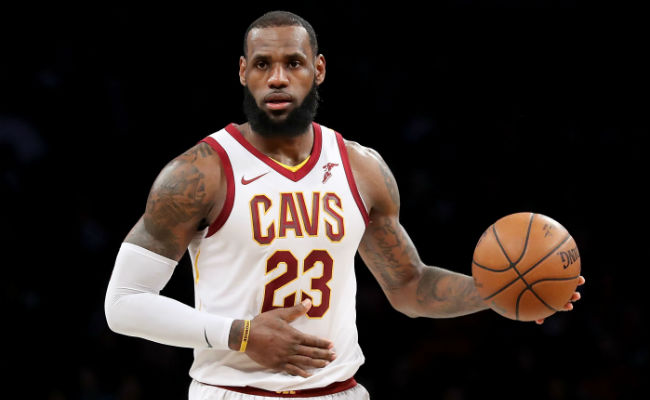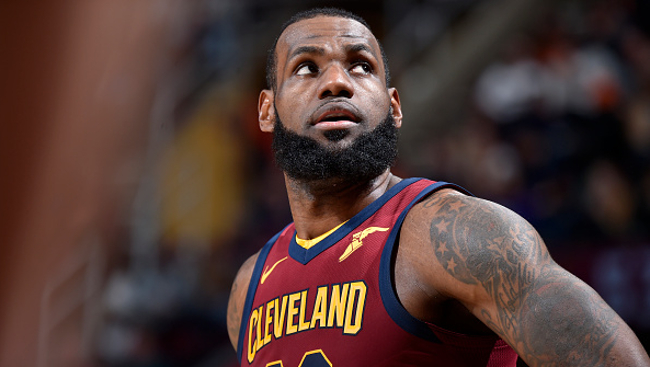
LeBron James is not going to win the NBA’s Most Valuable Player award this year. Try as he might, and perform as he has, it still won’t be enough. This much is certain.
The NBA’s MVP remains the most fascinating award in sports. It’s a media-voted, narrative-driven exercise in who deserves the league’s most prestigious individual distinction each year. Now given away on a surprisingly entertaining award show weeks after the championship trophy is handed out, the MVP has its own history, its own mystique. For a player, it is the holy grail of the NBA’s regular season.
That’s why LeBron, the best player of this generation and perhaps ever, was openly pining for the award last week.
“I would vote for me,” James said. “The body of work, how I’m doing it, what’s been happening with our team all year long, how we’ve got so many injuries and things of that nature, guys in & out, to be able to still keep this thing afloat, I definitely would vote me.”
But LeBron isn’t winning that award, no matter how good his argument is nor his statistical case. Per usual, his stats are outrageous, as they have been for his entire career, and in the statistical sense LeBron is always an MVP candidate.
Since his second year in the league he’s averaged between 26.3 and 30 points a game, and in 13 of those seasons that was good enough for at least fifth in the league. He’s finished top-10 in assists nine times, and is set to finish second this year. He’s led the league in numerous, all-encompassing advanced statistics like PER, Win Shares, Box Plus/Minus and Value Over Replacement Player multiple times.
LeBron always has MVP numbers, even as the world has become immune to it, and this season is no different. His 27.4 points per game are good for third in the league, and since he has played in every game this season, he actually leads the league in total points. He’s pushed his team to the 3-seed in the East despite roster upheaval, a front office in disarray, a slew of injuries to projected starters and an odometer that says his performance is near impossible.

Still, it has long been assumed that James Harden — who finished second in voting for the award in two of the last three seasons — would win the MVP this year. He was next in line, the narrative favored him and after his close finishes, he “deserved” an MVP. With another stellar season, it only served right that he would be finally given one.
Like all of the other MVP candidates, his numbers have been spectacular. His career high 30.6 points per game lead the league, his Rockets have the best record in the NBA and he deserves some recognition for his play.
But if the argument against LeBron is centered on his often lackadaisical defense, Harden is hardly the antithesis, and if the 16-win difference between the Cavs and the Rockets is the difference in the award, that runs against the standard established last year when Russell Westbrook won the award while trailing the league’s best record by 20 games.
Each year the debate rages over just what the NBA’s MVP even is. Is it the best player on the best team? Is it the player having the best individual season? Is it the anointing of the best player in the league? Or should the award be awarded to the league’s literal most valuable player, the one who makes the biggest impact on their team.
That last point is the one LeBron tried to hammer home when Steph Curry won the first ever unanimous MVP over him two years ago, saying “Sometimes the word most valuable, or best player of the year, you can have different results.” History has shown that LeBron is extremely valuable to his team, and his absence causes them to crater. Whether it’s for a three-minute break in the second quarter or a four-year hiatus, LeBron’s teams are simply much worse without him.
LeBron’s problem is that him winning an MVP simply isn’t interesting anymore, and it’s the reason he probably won’t ever win another. The common refrain is that voters are tired of voting for him, or that he could win it every year if they went by a specific definition. It’s the two inherent flaws in the NBA’s MVP: It’s not clearly defined and thus not a objective award. Voters can be swayed, which is why each year there are campaigns by players and teams, and gifts handed out to writers by teams to help remind them who the MVP should be.
If LeBron’s goal is to win another MVP award, it could play into where he decides to play the rest of his career. Kevin Durant seemingly renounced all his MVP candidacy the moment he decided to play next to Steph in Oakland, and LeBron could be making a similar decision if he decides to play next to Harden in Houston.

But going to the Lakers and carrying their young core to heights they have yet to see? Or another team that lacks a second star or the talent to truly compete for a title, but requires the kind of otherworldly performances from LeBron on a nightly basis that would inflate his statistics beyond their already gaudy norm? Or maybe he’ll have to wait a few years until he’s an aging all-time great on his last legs, going out swinging like Wolverine in Logan, giving his very last ounce of energy and looking like a weathered shell of himself in the process? That might be just the right narrative to win him an MVP.
That is likely what will be required of LeBron, especially as new talent waits in the wings, and much like Harden, will ascend to the point where they are next in line. Giannis Antetokounmpo and Kyrie Irving both drew MVP buzz this year, and they both look to only get better and push their teams further into title contention as LeBron’s career wanes down. Joel Embiid seems primed for an MVP or two in his career. Karl-Anthony Towns and Kristaps Porzingis have limitless potential. Their position-bending mythical predecessor Anthony Davis just turned 25 and will steal votes from Harden this year even as he fights for his playoff life in the last two weeks of the season.
Which isn’t to say this method is unfair, it’s just the way it works. Jordan lost MVPs he should have won, too. So did Kobe, who probably owes Chris Paul an MVP.
So, yeah, LeBron is probably done winning MVPs, no matter how sensational his statistics. If he wants to win one, he better make one of these next few phenomenal seasons of his career dramatic or hand out nice trinkets to the voters as he looks to sway them, because his latest soliloquy on his own greatness was neat, and he has a point, but MVPs are not won with rants. With statistics so close that choosing between the two is splitting already split hairs, MVPs are often won with narratives and campaigns and by merit.
And if he does? Well, that’ll be just one more accolade he shares with that ghost in Chicago that he’s still chasing.






